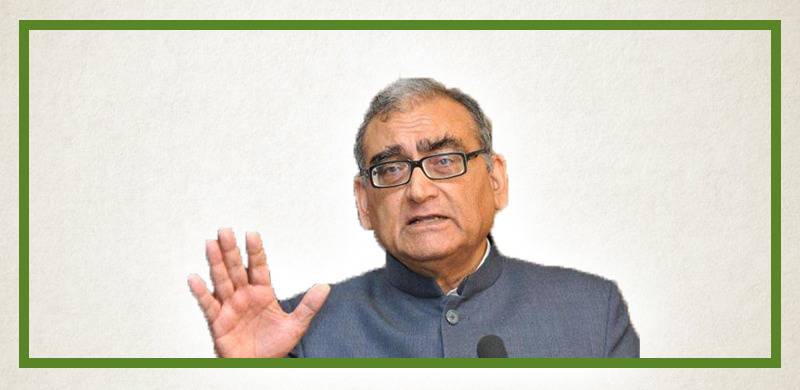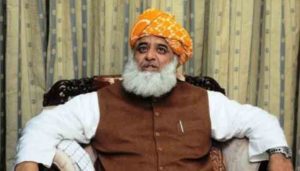
India can only be uplifted by a mighty historical popular upsurge, i.e. something like a French Revolution. Anyone with even a little idea of history can see it dawning in the horizon, argues Justice Markandey Katju.
All indications are that some kind of French Revolution is coming in the Indian subcontinent. Here are the facts:
In Pakistan, the PPP and PMLN are perceived as corrupt, and Imran Khan, who professed accountability and transparency, abandoned all his principles by giving PTI tickets to dubious 'electables', taking help of religious extremists in the elections, and sacking Atif Mian, the renowned economist from the Economic Advisory Council only because he was an Ahmadi.
As for Maulana Fazlur Rahman, who led the 'Azadi' March recently, he is a well-known reactionary thug and opportunist.

Indian Prime Minister Modi, who is an expert in gimmicks like Yoga Day, Cow protection, Ram Mandir, Swatchata Abhiyan, abolition of Article 370, etc (which he resorts to in order to divert attention from the terrible economic crisis India is going through, which his rabidly anti minority government has no inkling how to solve) said in the Howdy Modi function in Houston recently that everything is fine in India (he said it in several languages). But the truth is the reverse, nothing is fine in India, the economy is tanking, Kashmir situation getting worse, etc. It was like the Nazi Propaganda Minister Dr Goebbels saying that Germany was winning the war, when everyone knew it was losing.
In India, 7 individuals own as much, if not more, wealth than the bottom half of its 1.35 billion people (one of the 7 owning an estimated 3.5 lac crore rupees=$50 billion, and who reportedly spent thousands of crore rupees recently on his daughter's wedding)
Surely this monstrous and glaring inequality is unacceptable, and cannot continue for long, when tens of millions of Indian children do not get enough to eat.
So it has to be replaced by another system which enables India to rapidly industrialise and modernise, but such replacement requires a revolution.
Hence it can only be achieved by a mighty historical popular upsurge, i.e. something like a French Revolution. Anyone with even a little idea of history can see it dawning in the horizon.
All indications are that some kind of French Revolution is coming in the Indian subcontinent. Here are the facts:
- Everything has collapsed in India, and all state institutions have become hollow and empty shells, and largely corrupt. The Indian economy is tanking and the people's distress is growing, with record and rising unemployment (12 million youth entering the job market in India every year but jobs becoming less, as the National Sample Survey, a government of India organization, admits), appalling level of child malnourishment (every second child in India is malnourished, as Global Hunger Index and UNICEF reports indicate), 50% of Indian women anaemic, almost total lack of proper healthcare and good education for the masses, farmers suicides continuing unabated (well over 300,000 already), etc.
- Our political leaders seem totally unconcerned, seeking only power and pelf (see my articles 'Why celebrate Republic Day when the Constitution has become a scarecrow' published in the in, and 'A storm is brewing in India, but chess players can't see it'.
- Just as before the French Revolution, public debt had reached colossal heights, so also is the situation in both India and Pakistan. Pakistan had to go begging to the IMF for a 6 billion dollar loan (which increases its debt to 106 billion dollars, much of its revenue going just to service it). The Indian government forced the Reserve Bank of India to give it 1.76 lac crore rupees to cover its fiscal deficit.This reminds one of the situation in France before the revolution, when the French monarchy kept taking loans from Dutch bankers to cover its huge deficit, until the time came when the bankers refused to give any more loans, realising the same would never be recovered.
- Swarms of millions of locusts descended on Karachi recently, and the Sindh Agriculture Minister Ismail Roohi made a heartless comment that people should eat biriyani made of locusts. This reminds one of the remark of Foulon, the French Controller of Finance under Louis 16th, who said that if people did not have food to eat they should eat grass. After the storming of the Bastille on 14th July, 1789 Foulon tried to hide, but was caught, his head cut off, grass stuffed into it, put on a pike, and paraded through the streets of Paris with a poster: “Here is the man who wanted us to eat grass ". So Ismail Roohi should watch out

- In Kanpur, a truck carrying fishes overturned, and people nearby rushed to grab some. Similarly, in Odisha, a truck carrying hundreds of chicken crashed, and people rushed to grab some. This reminds one of a scene in Dickens' novel ' A tale of two cities ' where a barrel of wine being carried on a vehicle in a Paris street broke up, and nearby people rushed to swallow some of the wine spilled on the street. One person dipped his fingers in the red wine and wrote on a wall ‘Blood ', symbolising the bloodshed and guillotine which was coming
- The imposition of President's rule in Maharashtra reminded me of the tennis court oath on 20th June, 1789 in Versailles during the French Revolution (see my article 'Imposition of President's rule in Maharashtra is unconstitutional
- Skyrocketing food and fuel prices are common to both the situation in France in 1789, and in India and Pakistan today.
- The King and aristocrats in France were totally oblivious of the approaching storm. On 14th July 1789, when the Bastille was being stormed, Louis 16th wrote in his diary 'rein' (nothing) i.e. nothing was happening. Similarly, Indian politicians are blissfully unaware of the rising tide which will one day engulf them (see my article ' Wake up Bourbons' on my blog Satyam Bruyat).They have no genuine love for the country, and are only interested in power and pelf by hook or crook. For their vote banks they polarise people, and spread caste and communal hatred.
In Pakistan, the PPP and PMLN are perceived as corrupt, and Imran Khan, who professed accountability and transparency, abandoned all his principles by giving PTI tickets to dubious 'electables', taking help of religious extremists in the elections, and sacking Atif Mian, the renowned economist from the Economic Advisory Council only because he was an Ahmadi.
As for Maulana Fazlur Rahman, who led the 'Azadi' March recently, he is a well-known reactionary thug and opportunist.

Indian Prime Minister Modi, who is an expert in gimmicks like Yoga Day, Cow protection, Ram Mandir, Swatchata Abhiyan, abolition of Article 370, etc (which he resorts to in order to divert attention from the terrible economic crisis India is going through, which his rabidly anti minority government has no inkling how to solve) said in the Howdy Modi function in Houston recently that everything is fine in India (he said it in several languages). But the truth is the reverse, nothing is fine in India, the economy is tanking, Kashmir situation getting worse, etc. It was like the Nazi Propaganda Minister Dr Goebbels saying that Germany was winning the war, when everyone knew it was losing.
- Rousseau, the philosopher of the French Revolution, and mentor to its leader Robespierre, wrote in his 'Discourse on Inequality'. It is surely contrary to the laws of nature that a handful of people gorge themselves with superfluities, while the starving multitudes lack the necessities of life ".
In India, 7 individuals own as much, if not more, wealth than the bottom half of its 1.35 billion people (one of the 7 owning an estimated 3.5 lac crore rupees=$50 billion, and who reportedly spent thousands of crore rupees recently on his daughter's wedding)
Surely this monstrous and glaring inequality is unacceptable, and cannot continue for long, when tens of millions of Indian children do not get enough to eat.
- The parliamentary system India has adopted runs largely on caste and communal vote banks. Casteism and communalism are backward feudal forces which must be destroyed if India is to progress, but parliamentary democracy further entrenches them.
So it has to be replaced by another system which enables India to rapidly industrialise and modernise, but such replacement requires a revolution.
- India's national objective must be to transform and uplift the country from the ranks of the underdeveloped countries into the ranks of the developed, highly industrialised countries, for only then can it abolish massive poverty, unemployment, malnourishment etc. But there are powerful forces and vested interests, both internal and external, which will oppose such transformation tooth and nail, as they do not want India to become another industrial giant like China.
Hence it can only be achieved by a mighty historical popular upsurge, i.e. something like a French Revolution. Anyone with even a little idea of history can see it dawning in the horizon.
